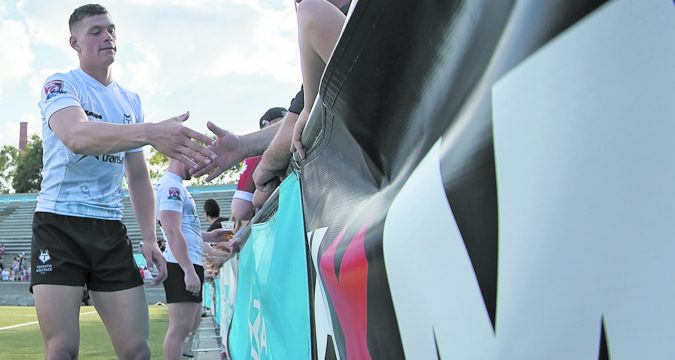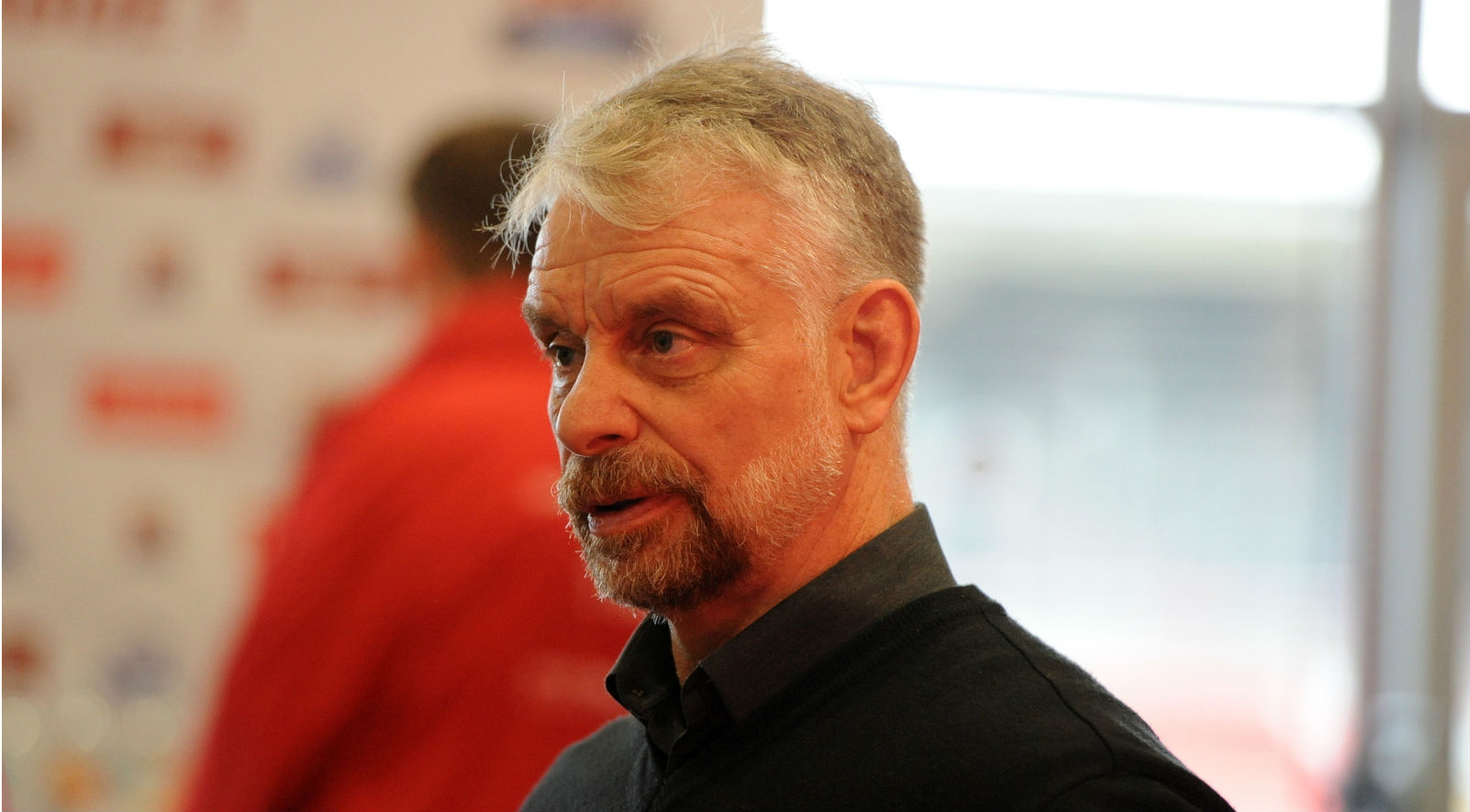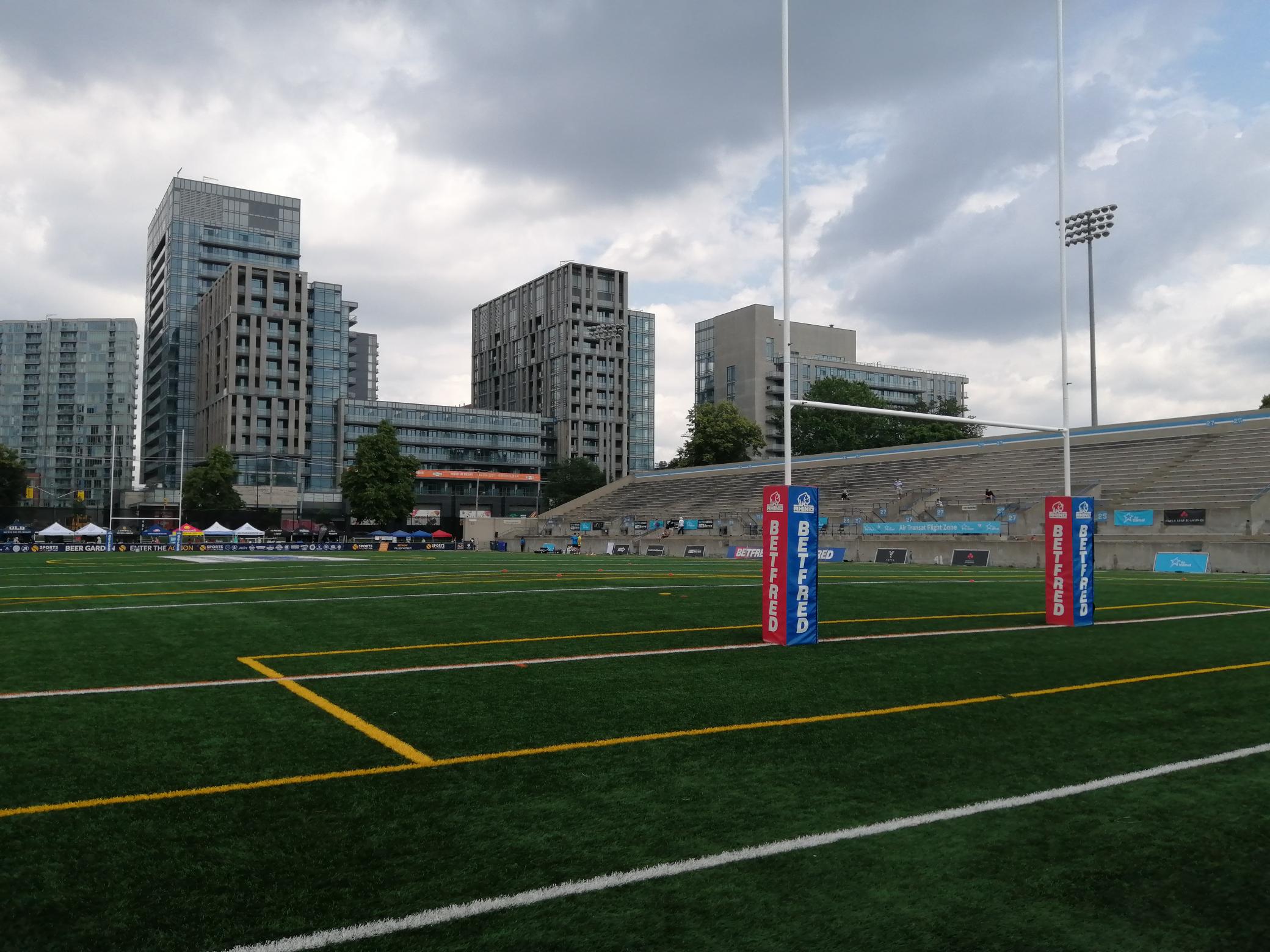
The date is July 8, 2017. Toronto Wolfpack are well on their way to promotion from League 1 after beating Gloucestershire All Golds 62-10, but this day is not about the Wolfpack’s star-studded line-up and yet another convincing victory. It is about 18-year-old Quinn Ngawati, who came off the bench during that aforementioned victory to become the first-ever Canadian-born player to play professional rugby league.
By standards that had been set elsewhere in rugby league, Ngawati’s felt like a watershed moment. It took London Broncos years to have a capital-born player in their side. Melbourne Storm needed 15 years to hand a first-grade debut to a Victorian-born player, Mahe Fonua. But here Toronto were, months into their existence, with a homegrown player in their match-day side.
However, there are several questions that critics of the Wolfpack – and there are plenty of those – have laboured since that day: where is the next Quinn Ngawati? Why aren’t Toronto ‘doing their bit’ for rugby league’s development by producing more Canadian players? The debate reared its head again this week, and it will likely continue to do so throughout the whole of Toronto’s first season in Super League.
There are no apologies made at Toronto for the fact they are operating with a top-down philosophy. Build it, and they will come. But for those who believe nothing is being done to try and get more Canadian children exposed to rugby league, you only have to spend a short period of time with Brian Noble, a man who has been with Toronto since day one.
“There is nobody who has tried to bring Canadian players into this club more than me,” explains Noble when he is asked to try and defend Toronto’s lack of home-grown talent. “People forget that in year one we trialled 70 Canadians, Americans from all over the world, Jamaicans.. we went on the road. We discovered that former NFL players were clearly athletic enough, but the skill set needed to get up to a level we were playing at then in League 1, let alone now in Super League, wasn’t quite there.”

Early on into their existence, Noble and Toronto had seen enough to know they needed to change their philosophies. Trying to convert players from other codes had its limitations – which have been magnified since promotion to Super League. No Canadian rugby union player is going to be ready for elite rugby league without development elsewhere: another issue for the Wolfpack.
“We signed six players in year one to play in League One,” Noble recalls. “Three were Canadians, a Jamaican and two Americans. The issues with visas meant they couldn’t play with us, they couldn’t be dual-registered and they were effectively gone from the game. We had to un-sign them and tear up the professional contracts we handed them because we simply couldn’t play them. Because of the rules, we couldn’t give them opportunities. We’re swimming against the tide in that regard.”
So instead of converts, Toronto have stripped their focus all the way back to tomorrow’s generation of rugby league players in Canada. “We don’t do development in terms of going into schools differently to any other club,” Noble reveals. “We’re committed to all of that.. schools in Toronto are beginning to learn about rugby league and we’re seeing concrete evidence that more fans are coming to the games.”
Noble also believes Toronto’s policy of bringing the best players to Canada is the right way to inspire youngsters in a city already swamped by mainstream professional sporting teams. “Where would we be if we hadn’t have had the success we’d had over the last three years?” he says. “Would anyone be talking about rugby league in Canada if we’d done it another way? I’m really not sure. There’s still 1,500 people watching a cobbled-together national team, and these are the dynamics we can help with. We can show them a pinnacle, we can show them there’s a way to it but we need to build a yellow brick road. It won’t be a mile of tarmac at a time though, it’ll be cobble by cobble.”
But of course, that policy will only give further fuel to the detractors who say Toronto bring nothing to the sport. It could, by their own admission, be years before the fruits of their labour are exposed to the world – but Wolfpack chairman Bob Hunter insists it is the right path to take.
“We simply have to develop this game at youth level in Canada,” he explains. “Yes, we owe it to our fans to put the best squad we can out there now, but not at the expense of ignoring junior talent. Financially we are putting significant sums into doing that, but it’s a small niche sport right now.
“We’d absolutely love Canadians in our training squad and we’re committed to setting up an Academy and training young Canadian players, but we’re just three years in here. Believe me, there are kids who we have got playing rugby.. but they’re still kids. It’s only been three years. It will take time, but I hope rugby league people will see that there’s a process going on. Stick with us.”
Noble heads up a scouting group which includes ex-pats and people with rugby league connections who are on the ground in Canada in case a rough diamond emerges. Those contacts include former Wigan and Bradford half-back Henry Paul, who coaches Canada’s rugby union Sevens side. “I watch Sevens non-stop and speak with Henry to see if there’s anyone he thinks we could look at,” Noble said.
“There would be nobody more excited than me if a Canadian came in but you’ve got to be careful. I understand the dynamics of certain clubs; you need Wiganers playing at Wigan and Bradfordians playing at Bradford because of the importance the rugby club has on a local community, but this is an international story and we have to approach it differently.”
 But for a sport which is very much embryonic in Canada, there are huge challenges. “The playing scene, and the quality in it, really isn’t great right now,” Noble admits. “There are eight rugby league teams in the whole of Canada – three of them are in Vancouver, which is six hours away from Toronto. I promise that we scour the scene constantly though – we don’t just ignore it.”
But for a sport which is very much embryonic in Canada, there are huge challenges. “The playing scene, and the quality in it, really isn’t great right now,” Noble admits. “There are eight rugby league teams in the whole of Canada – three of them are in Vancouver, which is six hours away from Toronto. I promise that we scour the scene constantly though – we don’t just ignore it.”
As the poster boy for Canadian rugby league, Ngawati’s story offers proof that there is a route for the top to any Canadian that is good enough. He may be back with the Wolfpack soon, too. “We’re actually trying to bring him back because I think he’ll make a superb league player,” Noble revealed. “But the challenge is giving him somewhere to play.”
But whether Ngawati returns, a surprise convert emerges or the school-children of today are inspired by Toronto’s story, two things are clear. One is that Toronto is unlike any other rugby league club when it comes to development, and as such, they shouldn’t be compared to the rest. The other? There is work being done at ground level to try and make sure the future is bright.
“It took 15 years for Mahe Fonua to come through the Melbourne model,” Noble says. “Our responsibility at Toronto Wolfpack has changed so that if kids in Canada see a Sonny Bill Williams playing on their doorstep, we make sure we capitalise on those kids who want to pick a rugby ball up. That’s our challenge and our remit; the kids of nine, ten or eleven who want to play rugby, we have to facilitate that and give them proper opportunities to do so.
“That’s where we come in now hopefully, but first and foremost, we have to find winners to perform at this level, we have to create the hottest ticket in town and once you do that, everything else follows. I’m consciously committed to development – despite what people think. We have a responsibility to all the people we enthuse to provide a platform to at least be able to get to that level if they aspire to reach it. Quinn has shown there’s a way. Hopefully there’s more like him.”
